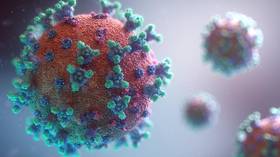‘Omicron’: How fear of new Covid strain gripped the world
A newly identified, heavily-mutated coronavirus strain dubbed ‘Omicron’ is triggering alarm across much of the globe, prompting a rash of travel restrictions amid fears that existing vaccines will be unable to stop the variant.
New Covid ‘variant of concern’
The World Health Organization (WHO) convened an emergency meeting on Friday to discuss the viral strain, which had previously been known as B.1.1.529, declaring it a “variant of concern” while giving it the new name of “Omicron.”
“Preliminary evidence suggests an increased risk of reinfection with this variant, as compared to other strains,” the agency concluded. While little is yet known about Omicron, the WHO’s chief scientist Soumya Swaminathan noted that it carried “a number of worrying mutations” that could make the strain more infectious than any observed before.
... with dozens of ‘worrying mutations’
The large number of mutations have also prompted fears that Omicron could be resistant to existing vaccines and therapeutics, especially as currently available immunizations have been seen to lose effectiveness over time against other known variants of concern.
One major determining factor in the transmissibility of the virus is the evolution of its “spike proteins” – microscopic protrusions that allow the coronavirus to access and hijack host cells, causing infection. A strain detected in South Africa in May 2020 and dubbed ‘Beta,’ for example, had three significant mutations in its spike region, which helped make it between 20 and 30% more infectious. Omicron, on the other hand, is thought to have at least 32 spike mutations.
Omicron already crossed continents
The first cases of Omicron were identified in the African nation of Botswana on November 11, with additional infections detected in South Africa just days later. Since then, Omicron is believed to now make up 90% of new infections in South Africa’s Gauteng region, according to local epidemiologists.
Hong Kong registered its first Omicron case on Thursday, while Israel reported an infection from a traveler returning from Malawi on Friday and is now monitoring two other suspected patients, suggesting the strain is quickly spreading far beyond southern Africa where it was first spotted.
... hit Europe
Belgium became the first European nation to detect the strain within its borders on Friday. The discovery set off alarms across the continent and beyond, with the UK’s Health Security Agency deeming Omicron “the worst variant we have seen so far.”
... and paralyzed travel
As news of the strain dominated headlines for much of Friday, Italy, France, the Netherlands, Denmark, Spain, Germany and the Czech Republic, among other European countries, declared new travel bans. Russia has also joined the fast-growing list of countries to bring new travel bans, along with the United States, the Philippines, Malaysia, Japan, Singapore, Brazil and Bahrain.
Even though the WHO warned against “acting too hastily” with travel bans, European Commission President Ursula von der Leyen, called to suspend all air travel to and from countries with reported cases of the new variant until officials have a better understanding of the strain.
What's next?
Though Omicron has already made major waves around the world, impacting global stock markets and international travel, there is still much to be learned about the new variant and the danger it poses.
Fewer than 100 full genome sequences were available for review as of Thursday, and the WHO’s technical head on Covid-19, Dr. Maria Van Kerkhove, said it could take several weeks before much insight is gleaned into the strain and its mutations.
High on the agenda, however, is determining whether Omicron is resistant to currently available vaccines, which many nations have banked on to curb their outbreaks and ultimately bring the pandemic to an end.
Some of the world’s largest pharmaceutical firms have also rushed to roll out strategies for how to manage the new strain, among them Pfizer, BioNTech, Moderna and Johnson & Johnson, each of which claimed to be closely monitoring Omicron and looking at ways to alter their existing vaccines and boosters.

















